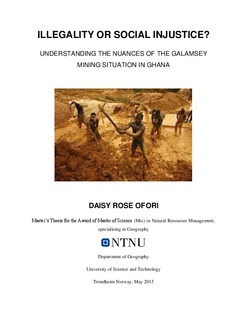Illegality or social injustice? : understanding the nuances of the Galamsey mining situation in Ghana
Master thesis
Permanent lenke
http://hdl.handle.net/11250/2373034Utgivelsesdato
2015Metadata
Vis full innførselSamlinger
- Institutt for geografi [1112]
Sammendrag
Since the implementation of the Economic Recovery programme (ERP) in 1983, Ghana’s minerals sector has witnessed a resurgence with corresponding significant contribution to the country’s economy. Today, the minerals industry is only second to Agriculture in terms of contribution to GDP. However, the industry has also been overwhelmed by the wave of unlicensed small scale miners popularly referred to as Galamsey miners who are operating illegally. The Galamsey miners and their activities are considered a nuisance to the environment and the sustainability of the industry. Consequently, these small scale miners are often tagged as criminals who must be expunged from society. This study however brings new evidence to the fore by demonstrating that Galamsey mining is rather a product of social injustice and unequal power relations- which have combined to marginalise, deprive and push the vulnerable poor in mining communities into the Galamsey business.
The aim of this study was to (1) Understand the narrative surrounding the Galamsey mining menace from the perspective of different stakeholders (2) To gain insight into how interactions among the stakeholders produces unequal power relations and how this reinforces the Galamsey business (3) To deconstruct the Galamsey phenomenon using a social justice theory. To achieve these aims, the study was framed and analysed based mainly on Nancy Fraser’s conceptualisation/theorization of Social Justice and complemented by ideas from political ecology focusing on power relations. The study data was obtained from Noyem, a mining community in Ghana. Qualitative data collection techniques such as interviews, focus group discussion and observations were used to collect data from 49 research participants which included Galamsey miners, local opinion leaders and Government officials.
The study found that the government, media and large scale mining companies share a strong and dominant anti- Galamsey sentiment. The miners and most members of the community on the other hand are to a large extent in favour of Galamsey mining. It was found that, the wide divergence in opinion has made it difficult to find a lasting acceptable solution to the problem. More importantly, the study found that the issue of Galamsey in Ghana comes down to social, economic and political inequalities in society. These inequalities which have been perpetuated through years of economic reforms in the mining sector have led to exclusion, impoverishment, landlessness and unemployment in the mining community of Noyem. Most importantly, these situations of inequality and injustice have driven locals of the community to resort to Galamsey mining as their means of livelihood and survival. Finally, the study also revealed that, unequal power relations both at the micro and macro levels have not only denied the locals of Noyem economic opportunities but also a voice in decision making processes, further leading to their marginalisation. Thus, reinforcing existing social inequalities and injustices that ultimately lead to Galamsey mining.
Keywords: Social Justice, Political Ecology, Galamsey mining.
